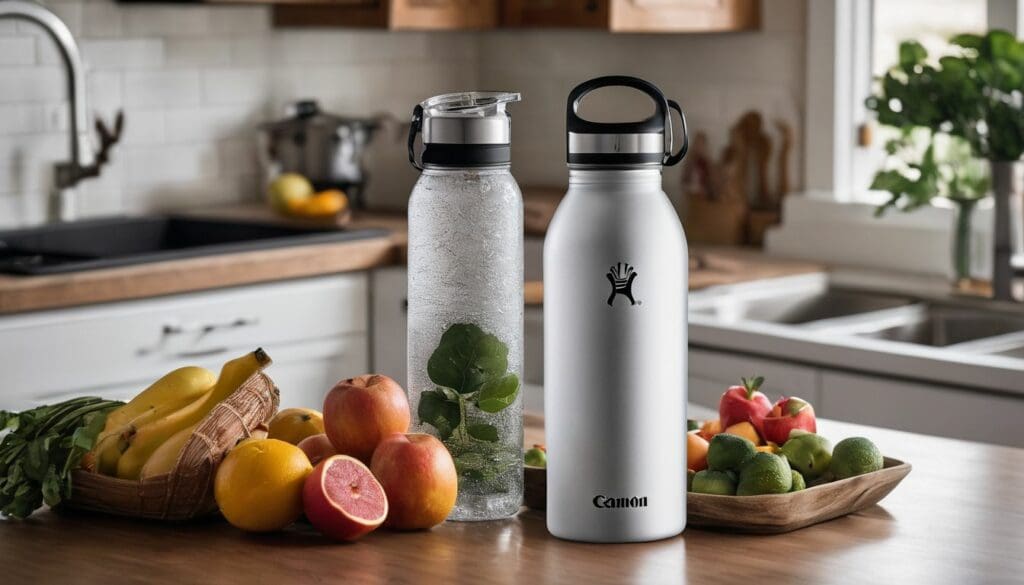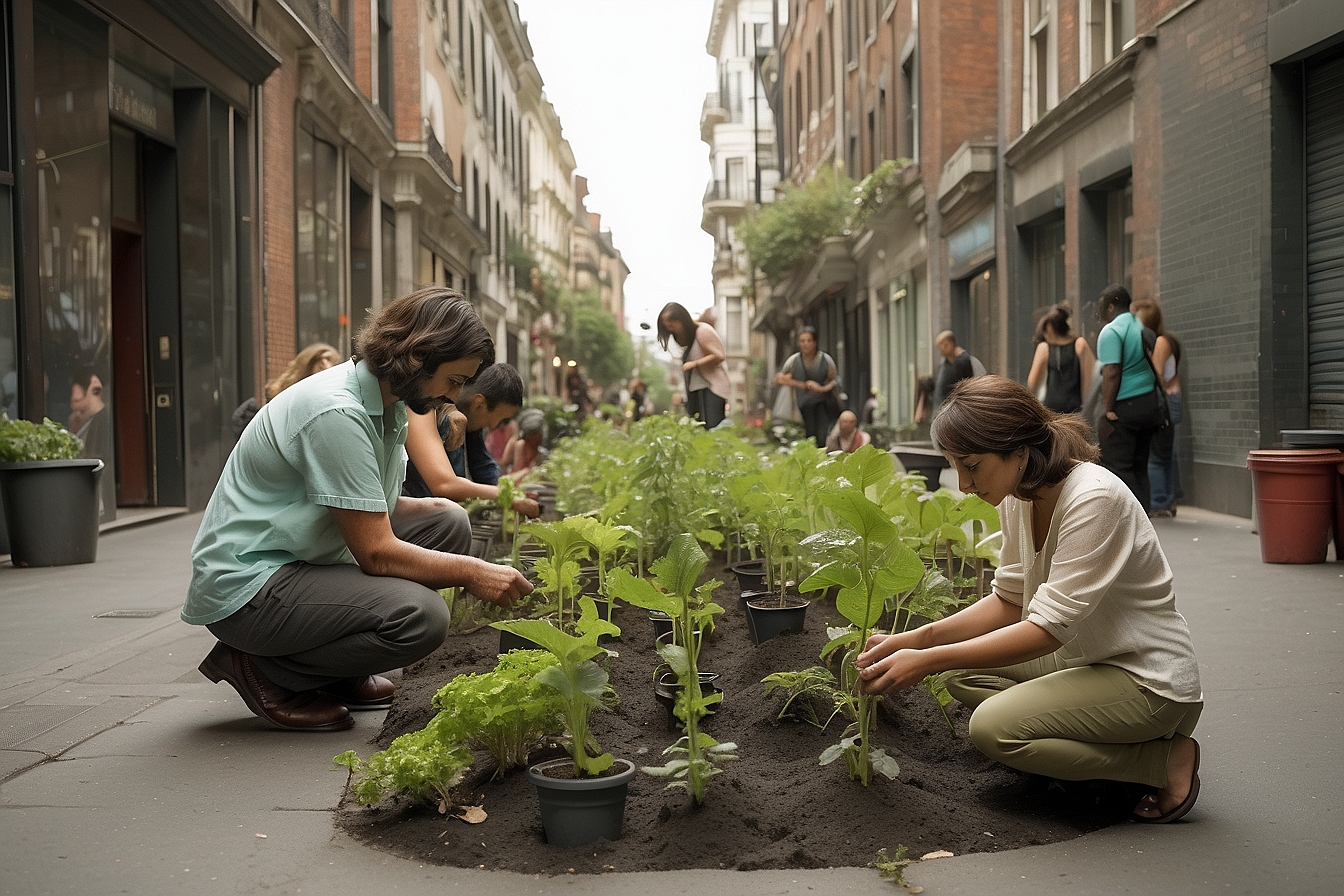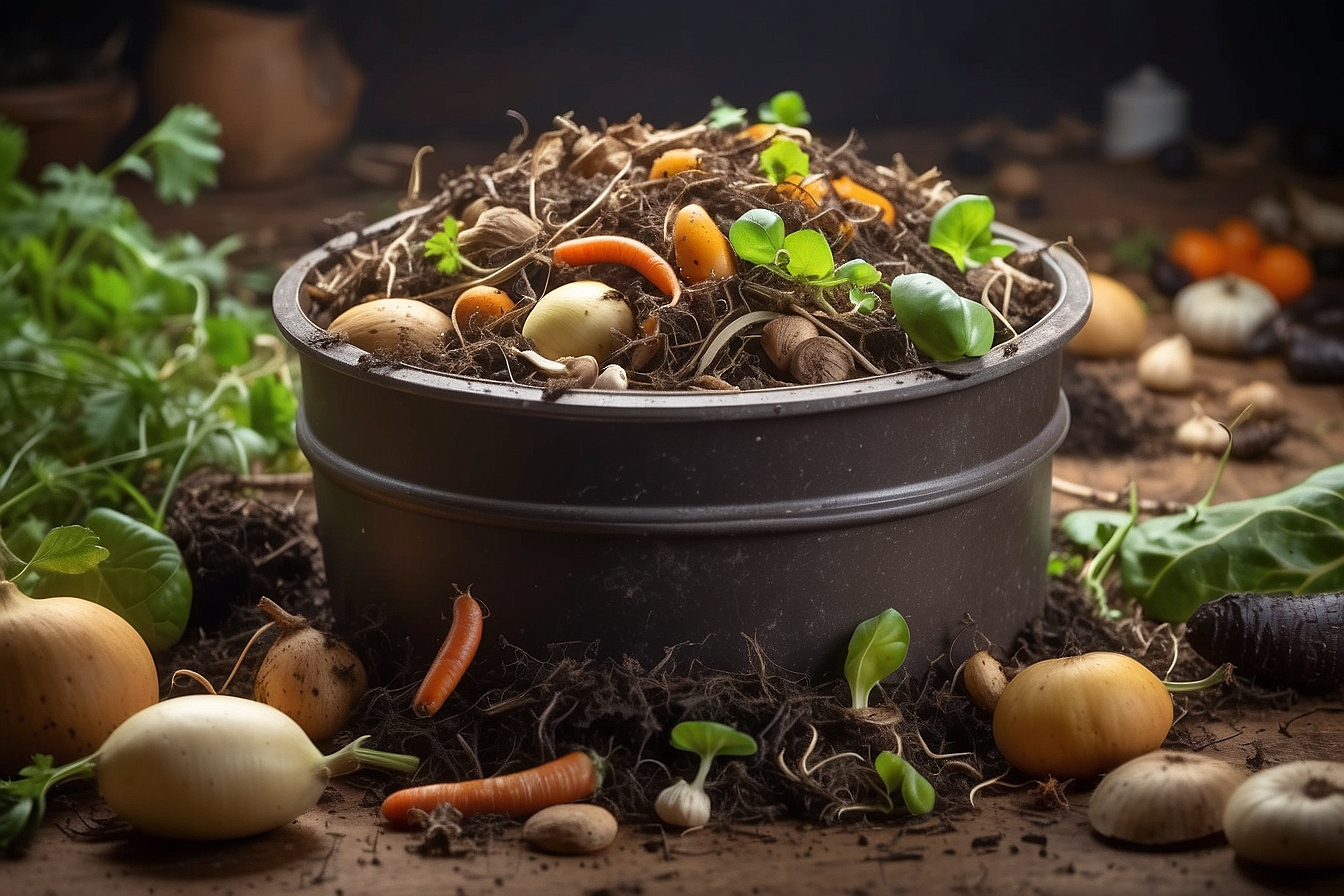We’ve all had that moment; the heart-sinking sight of a bin overflowing with plastic detritus. It’s an all too familiar scene, isn’t it? Every single year, around 300 million tonnes of plastic waste are churned out globally – almost mirroring the weight of every person on Earth combined! Today marks the start of our mission to transform our homes into bastions in the war against this relentless tide of plastic.
So let us take a stride forward and delve into straightforward but impactful methods by which we can diminish plastic pollution, starting within the cosy confines of our own abodes.
Shall we embark on this pivotal journey together? Let’s roll up our sleeves and commence!
Key Takeaways
- Refill eco-friendly packs and use glass bottles for cleaning products to cut down on single-use plastics in your home.
- Choose bamboo toothbrushes and beauty products with minimal plastic packaging for personal care that’s kinder to the environment.
- Bring reusable bags to the grocery store, say no to plastic straws, use cloth napkins instead of disposable ones, and buy food in bulk to lessen plastic waste from kitchen and dining practices.
- Embrace composting food waste at home as it enriches soil while reducing landfill contributions which can create harmful gases.
- By repairing or repurposing items rather than throwing them away, we prevent additional plastic pollution while fostering a creative approach to consumption.
Why Should We Reduce Plastic Waste at Home?
Moving on from the basics of sustainable living, it’s crucial to address our home environments. Reducing plastic waste at home is a direct way we can make an impact on environmental sustainability.
Every piece of plastic we refuse or reduce cuts down on pollution and conserves resources. Simple swaps in our daily routine, like opting for a bamboo toothbrush or choosing cloth napkins over disposable ones, significantly minimise our ecological footprint.
Our choices echo beyond just personal benefit; they set an example for those around us and contribute to a larger cultural shift towards eco-friendly habits. Plastic often ends up in landfills or as litter in natural environments where it takes hundreds of years to decompose, causing harm to wildlife and ecosystems.
Taking action within our homes is a powerful step towards green living that protects these valuable habitats for future generations.
5 Ways to Reduce Plastic Use in Personal Care and Cleaning Products
Choose eco-friendly refill packs and glass bottles for household cleaners. Invest in reusable water bottles and containers, switch to bamboo toothbrushes, as well as look for beauty and hair products with less plastic packaging.
These simple changes can make a big impact on reducing plastic waste at home.
Choose eco-friendly refill packs
Opt for eco-friendly refill packs to reduce plastic waste at home. By choosing refillable options for household cleaning products and personal care items, we can significantly lessen our environmental impact.
Eco-conscious individuals can make a positive difference by selecting products that come in sustainable packaging and promote a circular economy. Refill packs help to minimise single-use plastic consumption, supporting our efforts towards zero waste living and environmentally friendly habits.
Refill packs provide a simple yet effective way to contribute to minimising plastic use in our daily routines. Our commitment to choosing eco-friendly alternatives such as refillable options aligns with sustainable living practices and supports the reduction of plastic pollution.
Use glass bottles for household cleaners
Switching to glass bottles for household cleaners is a great way to reduce plastic waste in your home. By using refillable glass containers, you can minimise the need for single-use plastic cleaning product packaging.
Glass is also a durable and recyclable alternative that helps to cut down on environmental impact and supports sustainable living practices. Refill your glass bottles with eco-friendly cleaning solutions or make your own DIY natural cleaners to further lessen plastic usage.
Invest in reusable spray nozzles and dispensers to go along with your glass bottles for an even more eco-conscious approach. These small changes can lead to a significant reduction in household plastic waste, contributing towards a healthier environment for future generations.
Invest in reusable water bottles and containers
Choose to invest in durable, reusable water bottles and containers for storing food. By opting for these eco-conscious alternatives, we can significantly reduce our reliance on single-use plastic items such as disposable water bottles and plastic food containers.
Reusable options are not only environmentally friendly but also cost-effective in the long run as they eliminate the need for continuously purchasing single-use plastics. Additionally, by using reusable bottles and containers made of sustainable materials like stainless steel or glass, we contribute to minimising plastic pollution while promoting waste reduction.
Opting for reusable water bottles and containers provides an opportunity to make a positive impact on the environment without compromising convenience or quality. Making this small change at home aligns with our commitment to reducing plastic usage and supporting a sustainable lifestyle – one that prioritises eco-friendly living practices through conscious choices that lessen our environmental footprint.
Switch to bamboo toothbrushes
After investing in reusable water bottles and containers, another eco-friendly switch we can make is to opt for bamboo toothbrushes. Bamboo toothbrushes are a sustainable alternative to plastic ones, as bamboo is a fast-growing and renewable resource.
By choosing bamboo toothbrushes, we can significantly reduce our plastic consumption in personal care products. Additionally, the bristles of bamboo toothbrushes are often made from biodegradable materials such as nylon-4 or boar hair, minimising their environmental impact even further.
Making the switch to bamboo toothbrushes aligns with our goal of reducing single-use plastic and embracing sustainable household practices. This simple change contributes to minimising plastic waste while supporting eco-conscious living in our daily routines.
Look for beauty and hair products with less plastic packaging
When selecting beauty and hair products, prioritise items with minimal plastic packaging. Opt for brands that use sustainable alternatives such as glass, aluminium, or cardboard for their product containers.
Seek out refillable options to reduce the need for new plastic packaging altogether. By choosing these environmentally friendly alternatives, we can significantly minimise our environmental impact while still enjoying quality personal care products.
Investigate beauty and haircare brands that actively promote ecoconscious choices by offering refills or non-plastic packaging options. By supporting such businesses, we can encourage more companies to adopt sustainable practices which will contribute to reducing overall plastic consumption in the long run.
5 Simple Ways to Reduce Plastic in the Kitchen and Dining Room
Bring your own reusable bags to the grocery store, say no to plastic straws and disposable utensils, use cloth napkins, compost food waste, and buy in bulk to reduce packaging waste.
These small changes can make a big impact on reducing plastic usage at home.
Bring your own reusable bags to the grocery store
When heading to the grocery store, remember to bring your own reusable bags. By doing so, you can significantly reduce single-use plastic waste and contribute to a more sustainable environment.
Reusable bags are durable, convenient, and an eco-conscious choice for environmentally conscious individuals looking to minimise plastic consumption.
Opting for reusable bags not only helps in reducing environmental impact but also sets an example for others to follow suit. Choosing this simple yet effective alternative aligns with our commitment towards minimising plastic usage at home and supports conservation efforts while creating a positive impact on the environment.
Say no to plastic straws and disposable utensils
Refuse single-use plastic straws and disposable utensils in favour of eco-friendly alternatives. Swap plastic straws for reusable metal, glass, or bamboo options. Opt for stainless steel or bamboo cutlery instead of disposable plastic ones.
By embracing these simple changes, we significantly reduce our contribution to plastic pollution and support a greener lifestyle.
Choosing sustainable alternatives helps to minimise environmental impact and promotes eco-conscious living. By making informed choices in everyday items such as straws and utensils, individuals contribute to the larger goal of reducing single-use plastics in their homes while advocating for a more sustainable future.
Use cloth napkins
Replace disposable paper napkins with reusable cloth napkins for a more eco-friendly dining experience. Cloth napkins are washable and can be used repeatedly, reducing the amount of paper waste generated from single-use paper napkins.
Plus, they add a touch of elegance to your table setting and contribute to minimising overall household waste.
Opting for cloth napkins supports sustainable living by aligning with the zero-waste lifestyle. It’s a simple yet effective way to reduce single-use plastic and paper consumption in our daily routines.
By making this small change in our kitchen and dining habits, we actively contribute to lessening plastic pollution while embracing environmentally conscious living practices. Let’s make the switch to cloth napkins today for a more sustainable future.
Compost food waste
When reducing plastic waste in the kitchen and dining room, we can also take steps to compost food waste. Instead of throwing away organic scraps like vegetable peels, fruit cores, and coffee grounds, consider composting them.
By creating a compost pile or bin in your backyard or using a kitchen composter, you can turn these food scraps into nutrient-rich soil for plants. Composting not only reduces the amount of waste sent to landfills but also helps enrich the soil and supports sustainable gardening practices.
Consider establishing a small designated area in your garden for composting or explore indoor options if outdoor space is limited such as worm bins or bokashi systems. By turning food waste into valuable compost rather than sending it to landfill sites where it releases harmful gases as it rots without air this approach contributes significantly towards minimising environmental impact at home while embracing eco-friendly living principles.
Buy in bulk to reduce packaging waste
Reducing plastic waste at home can be achieved by making conscious choices when purchasing groceries. Buying in bulk not only helps to save money but also minimises packaging waste.
Opt for products with minimal or no plastic wrapping, and select items that are stored in larger containers rather than single-use packets. By purchasing in bulk, you can significantly reduce the amount of plastic entering your household while supporting sustainable living practices.
Investing in bulk purchases for essential items like grains, cereals, and other non-perishables promotes environmental conservation and reduces single-use plastic consumption. Look for stores that offer refillable options for products such as soaps, detergents, and dry goods to further minimise plastic waste at home.
Other Ways to Reduce Plastic at Home
Embrace the “Four Rs” (Refuse, Reduce, Reuse, Recycle) to minimise plastic waste. Choose non-plastic packaging options and consider repairing or repurposing items instead of throwing them out.
Embrace the “Four Rs” (Refuse, Reduce, Reuse, Recycle)
To minimise plastic consumption and support eco-friendly living, we actively refuse single-use plastics wherever possible. We reduce our plastic waste by choosing non-plastic packaging options and opting for products with minimal plastic packaging.
Additionally, we make conscious efforts to reuse items or repair them instead of throwing them out, minimising the need for new plastics. By recycling all that we can, including glass, paper, and metal materials, we contribute to reducing overall environmental impact.
Choosing non-plastic packaging options is one way to minimise plastic use in daily life. Reusing items is another effective method in cutting down on plastic waste at home. Repairing or repurposing instead of discarding also significantly contributes to lessening our ecological footprint.
Choose non-plastic packaging options
Opt for non-plastic packaging alternatives when purchasing goods and groceries to help minimise plastic waste. Look for products that use recyclable, biodegradable, or compostable materials.
By opting for paper, glass, metal, or cardboard packaging instead of plastic, we can significantly reduce our environmental impact and contribute to a more sustainable future.
Supporting businesses that prioritise non-plastic packaging options encourages the development and availability of eco-friendly alternatives. It also demonstrates the demand for environmentally conscious choices in the marketplace.
Repair or repurpose items instead of throwing them out
Consider repairing or repurposing items before discarding them. This can help reduce the amount of waste produced and decrease your consumption of new products. By giving a broken item a new lease of life, you’re contributing to a more sustainable way of living at home, which aligns with eco-conscious choices and minimises plastic consumption.
Repurposing items not only reduces waste but also encourages creativity and resourcefulness in finding new uses for old objects. It’s an opportunity to exercise your imagination while making environmentally friendly decisions, thus contributing to the prevention of plastic pollution.
Conclusion: Making Small Changes for a More Sustainable Future
Making small changes at home is crucial for a more sustainable future. Choosing eco-friendly refill packs and avoiding plastic packaging are simple but impactful steps. Using reusable bags, utensils, and containers in the kitchen also contributes to reducing single-use plastic waste.
Repairing and repurposing items instead of discarding them adds to our efforts in minimising plastic consumption. Embracing the “Four Rs” – refuse, reduce, reuse, recycle – ensures we actively participate in preventing plastic pollution.
FAQs
1. What are simple ways to live sustainably and cut down on plastic use at home?
Green living tips include using reusable bags, avoiding single-use plastics, and selecting eco-friendly products to minimise plastic pollution.
2. How can I start reducing single-use plastic in my daily life?
Begin by swapping out disposable items with reusable alternatives; choose glass or metal over plastic, and always have a reusable water bottle handy.
3. Can eco-conscious choices at home really make an impact on the environment?
Absolutely! Making sustainable home practices a habit reduces your carbon footprint and helps prevent further plastic pollution in our oceans and landfills.
4. Are there any alternatives to plastic that I can incorporate into my lifestyle for ecofriendly living?
Sure! Opt for products made of bamboo, cotton, glass, or stainless steel as part of your commitment to ecologically responsible consumption.
5. Is it possible to achieve a completely plastic-free living space?
While totally eliminating all plastics might be challenging due to their prevalence in many products, aiming for minimising plastic use is achievable through conscious shopping and lifestyle changes.





